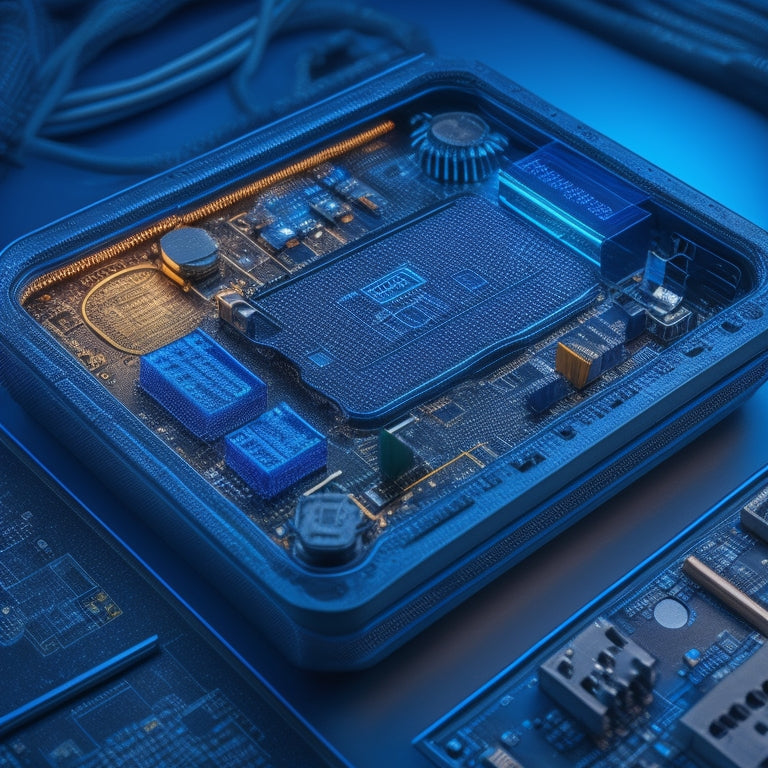
Electric Vehicle Maintenance: Tips for Battery Care
Share
Proper maintenance of electric vehicle batteries is essential to guarantee peak performance, longevity, and safety. Monitoring temperature, state of charge, and voltage is fundamental for peak performance and longevity. Adhering to manufacturer guidelines, such as Mercedes-Benz and Volvo, ensures safe and efficient operation. Regular maintenance, including oil and filter replacements, is crucial for maintaining battery health and optimizing performance. Safety precautions, such as wearing insulated tools and gloves, are essential for protecting against electrical shock and thermal burns. To tap into the full potential of electric vehicle maintenance, understanding the intricacies of battery care is just the beginning.
Key Takeaways
• Monitor temperature, state of charge, and voltage to ensure peak performance and longevity of electric vehicle batteries.
• Adhere to manufacturer guidelines for unique maintenance schedules and protocols to maximize battery lifespan and performance.
• Conduct regular coolant checks and inspections to ensure safe and efficient operation of electric vehicles.
• Adapt charging habits to suit individual needs and monitor them to optimize battery health and performance.
• Wear safety gear and follow workshop protocols and guidelines to protect against electrical shock and thermal burns.
Understanding Electric Vehicle Systems
As electric vehicles (EVs) continue to gain traction in the automotive market, it is important to comprehend the intricacies of their systems to guarantee proper maintenance and repair.
A thorough understanding of EV systems is essential for efficient battery management, which directly impacts energy efficiency. Effective battery management involves monitoring temperature, state of charge, and voltage to ensure peak performance and longevity.
Additionally, understanding the interplay between the battery, electric motor, and power electronics is key for maximizing energy efficiency.
Unique Manufacturer Requirements
While a comprehensive understanding of electric vehicle systems is essential, manufacturers like Mercedes-Benz, Volvo, and Scania have specific requirements that technicians must adhere to when performing maintenance and repairs on their respective electric vehicles.
These manufacturer guidelines dictate unique maintenance schedules and protocols that technicians must follow to guarantee the safe and efficient operation of these vehicles. For instance, Mercedes-Benz requires regular coolant checks for its high-voltage batteries, while Volvo necessitates six- to eight-weekly inspections depending on vehicle usage.
Scania, on the other hand, emphasizes the importance of risk assessments and safety protocols in workshops. By adhering to these manufacturer guidelines, technicians can ensure that electric vehicles receive the specific care they require, prolonging their lifespan and performance.
Safety Precautions and Protocols
Electric vehicle maintenance demands strict adherence to safety precautions and protocols to guarantee protection against electrical shock, thermal burns, and other hazards associated with high-voltage systems. Technicians must wear safety gear, including insulated tools, gloves, and footwear, to minimize the risk of electrical shock.
Workshop protocols and guidelines must be followed to secure a safe working environment. This includes electrical isolation and lock-out/tag-out systems to prevent accidental starts. A safety buddy should be present during Level 3 work and above.
Formal risk assessments should be conducted before starting maintenance, and technicians should be trained and accredited to work on high-voltage components. By abiding by these safety precautions and protocols, technicians can establish a safe and efficient maintenance process.
Regular Maintenance Essentials
Regular maintenance of electric vehicles involves a range of essential tasks, including oil and filter replacements for mechanical parts, to guarantee peak performance and longevity. This routine upkeep is vital for maintaining battery health and optimizing overall performance.
By following proper maintenance tips, electric vehicle owners can make sure their vehicles run efficiently and prolong battery lifespan. It is essential to monitor charging habits, as irregular or extreme charging patterns can negatively impact battery health.
Performance optimization can be achieved by adhering to recommended maintenance schedules and adapting charging habits to suit individual needs. By prioritizing regular maintenance, electric vehicle owners can enjoy a seamless driving experience while preserving the longevity of their vehicles.
Specialized Technician Training
In addition to following recommended maintenance schedules, specialized technician training is essential for guaranteeing the safe and effective servicing of electric vehicles. Technicians require in-depth knowledge of high-voltage systems and specific manufacturer guidelines. To meet certification requirements, technicians must possess technical skills in areas such as electrical isolation and lock-out/tag-out systems.
Hands-on experience and practical training are vital for technicians to develop the necessary expertise to work with high-voltage components. Manufacturer-specific training is also necessary, as each brand has unique maintenance requirements.
Frequently Asked Questions
How Often Should I Check My Electric Vehicle's Tire Pressure?
For peak performance and safety, check your electric vehicle's tire pressure at least once a month, using a reliable pressure gauge, and consider tire rotation every 5,000 to 8,000 miles to guarantee even wear and extend tire life.
Can I Use a Regular Car Wash for My Electric Vehicle?
When washing your electric vehicle, avoid regular car washes with high-pressure sprays and harsh soaps, as they can damage sensitive electrical components; instead, opt for a gentle, soap-free wash with controlled water pressure to guarantee a safe and effective cleaning process.
Are There Any Specific Storage Considerations for Electric Vehicles?
'Silent sentinels of sustainability, electric vehicles demand deliberate storage considerations. Climate control and ventilation systems must be carefully calibrated to prevent battery degradation, ensuring peak performance and longevity in storage facilities.'
Can I Charge My Electric Vehicle in the Rain or Snow?
Yes, you can safely charge your electric vehicle in rain or snow, as modern charging systems feature waterproof connectors and weatherproof charging stations designed to withstand harsh environmental conditions.
How Do I Properly Dispose of My Electric Vehicle's Old Batteries?
Did you know that 95% of electric vehicle batteries can be recycled? Proper disposal of old batteries is essential to minimize environmental impact. Battery recycling facilities can recover valuable materials like lithium, nickel, and cobalt, reducing the need for virgin extraction.
Related Posts
-

3 Ways Wind Power Boosts Home Value
Living near a wind farm can enhance your property's value in three significant ways. To begin with, proximity to wind...
-

10 Green Waste Solutions Every Homeowner Should Know
You can make a significant impact on the environment by implementing green waste solutions at home. Consider composti...
-

3 Eco-Friendly Automated Blinds for Contemporary Living
You're looking to raise your living space with automated blinds that not only exude contemporary style but also align...


